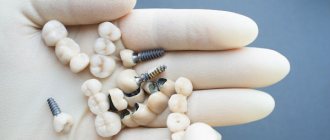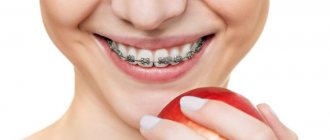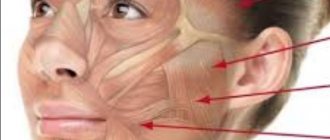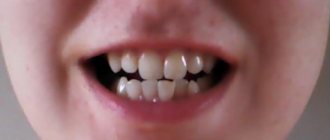In this material we will try to discuss the main questions that patients ask, namely the price of the operation, when is it better to remove a wisdom tooth, what to do before and after removal. All this will help you prepare and make it easier to endure both the operation itself and the postoperative period.
Oddly enough, this is the most common and familiar operation to all of us from childhood, about which a lot of video material has been filmed, but it is after this operation that the most complications arise in surgical dentistry.
Are you faced with the fact that the doctor recommended that you remove a wisdom tooth on the upper or lower jaw? Most likely there are certain indications for this.
If you have doubts or do not trust the doctor, consult another one, if you have doubts here, consult a third one. But don’t wait for that one person who will promise you everything you ask; after all, the general trend of medical thought will coincide.
Remember, you are the one who makes the decision to preserve or remove a tooth; if you don’t understand something, ask questions and don’t be shy with the doctors, because you are also responsible for the decision.
When is the best time to remove a wisdom tooth?
It is better to remove a tooth when it does not hurt!
Any surgical intervention during a period of acute inflammatory process occurs and is tolerated more difficult than during a period of relative rest.
The healing period in such cases is more painful and longer.
It follows from this that if you know that a certain tooth needs to be removed, do not wait until it hurts (IT WILL DEFINITELY HURT).
Contact your dentist as soon as possible to get rid of the problem as planned rather than as an emergency.
Tips before wisdom tooth removal
- It is better to remove wisdom teeth in the morning. The body is full of vital energy in the morning and easily experiences stress. Believe me, even just a visit to the dentist is stressful for some people. After the removal of the eighth teeth (wisdom teeth), pain may appear, which will go away after a few hours. If the operation takes place in the morning, then by the evening the pain will completely disappear and you will go to bed peacefully. In the morning, not only are you full of strength and energy, but so is your doctor. The doctor is not tired yet and is ready to devote maximum concentration of attention and time to the procedure. In case of any complications, you can easily go to the clinic, rather than looking for a 24-hour clinic with sleepy doctors at night or going to an ambulance.
- Eat before wisdom tooth removal (if you are not planning on sedation or general anesthesia). A well-fed person can tolerate stressful situations much easier. After eating, the body releases hormones that help you relax. Concentration decreases a little and you don’t really think about the procedures performed by the dental surgeon. More busy digesting food. A well-fed person's blood clots better than a hungry person's. This can greatly help to avoid unpleasant complications in the postoperative period.
- It is strictly forbidden to drink alcohol before and after wisdom teeth removal. Alcohol can greatly change the rheological properties of the blood, which in turn can lead to significant swelling or prolonged bleeding with a risk to life. A person in a state of alcoholic intoxication is not attentive and cannot soberly assess the situation and make decisions. Plus, I’m not able to accurately remember the doctor’s recommendations; all this will lead to unpleasant complications.
- What to take before wisdom tooth removal
Before the operation, the doctor will definitely inform you about all the medications that need to be taken before the operation. If you are very worried, you can use mild sedatives - valerian tincture, motherwort tincture, etc. Or the same drugs only in tablet form, for example Tenoten. If a long-term surgical intervention is planned, for example, removal of a retained or dystopic wisdom tooth, or tooth-preserving operations, or tooth implantation, it is reasonable to use non-steroidal anti-inflammatory drugs with a pronounced anti-inflammatory or analgesic effect, antibiotics, and antihistamines. It is better to entrust the choice to your treating dental surgeon about which drug to take. - A good mood is the key to successful treatment. Remember that a good positive attitude will shorten the recovery period and help you overcome surgical procedures more easily.
Tooth extraction – review
Hello, today I will tell you about my scary story with a happy ending.
1. Indications for removal and why I decided to do it
2. What you need to know
3. Removal procedure:
- simple tooth
- complex tooth
4. Doctor's recommendations and advice
5. Price
6. Pros and cons
1. WHY DECIDED TO DO THIS. INDICATIONS FOR REMOVAL.
I was always very afraid of visiting dentists, but the desire for beauty pushed me to the feat of removing all 4 wisdom teeth.
They grew up surprisingly early and quickly, by the age of 14, and immediately ruined my bite, because due to my small jaw there was not enough space for them and they began to grow on a slope, pressing and moving the dentition, horribly crooked front teeth...
One wisdom tooth generally grew horizontally, half remaining in the gum and tightly adjacent to the seven. This led to the formation of cavities and holes. But neither it nor the hole could be cured without removing the tooth, and caries gradually affected the neighboring tooth. This situation tormented me for three years.
But it was not torment and pain that pushed me to remove it, but the desire for a perfect smile. It is recommended to remove wisdom teeth when planning orthodontic treatment, which I so dreamed of. If you are interested and are thinking about braces, then read about my orthodontic treatment and for what smile I decided to have it removed - THE PATH TO PERFECTION
During orthodontic treatment, it is sometimes necessary to remove other teeth, but it is the removal of eights that is considered the most difficult.
Thus, I had 3 reasons for removal: to smile without covering my mouth with my hand, to get rid of the pain, since treatment was impossible due to the incorrect position, and to save the seven from inevitable destruction.
Here are the main indications for removal:
- Pericoronitis (inflammation of the gums near an erupting tooth)
- Incorrect growth, which can cause the remaining teeth to mix together
- Impossibility of treatment due to the fact that he has not grown correctly
- If it is incorrectly located in the gum or has not erupted completely
It took me 2 visits to remove 4 wisdom teeth
So removal was the right thing and the only decision that would inevitably have to be made, regardless of the placement of braces. If you have problem eights, then don’t leave them, don’t suffer with them, these are completely unnecessary teeth. Here's some material to prove it.
In the process of evolutionary changes, wisdom teeth began to be considered vestigial, that is, they have lost their necessity and are relics of the past life of humanity. In those ancient times, chewing food was not as simple as it is today; then its processing required much more effort than it does now.
But some medical scientists believe that wisdom teeth are not among the rudiments, since with their normal development and eruption they fully perform their function.
But the real reason for their problematic formation lies in an evolutionary change, namely the reduction of the jaws.
Modern man eats relatively soft, thermally and physically processed food, the chewing of which does not require massive jaws, and small jaws do not have enough space for eights.
The only purpose wisdom teeth may be needed is to serve as a support for bridges.
2. WHAT YOU SHOULD KNOW:
As I already said, going to the dentist is not for my nervous system. I was always afraid to even heal holes.
What can we say about removal! My fear of this was so great that I even thought about doing it under general anesthesia when I found out that this was practiced! As luck would have it, the day before I watched a program about medical errors, where they talked about fatal outcomes of tooth extraction. Imagine how I shook after that. I’ll write to you the main things you need to know in order to avoid sad consequences:
As we know, a huge number of bacteria live in the mouth, so tooth extraction is dangerous due to infectious complications, and even more so if there is already a bacterial process in the tooth or gum.
I’m not saying that everyone needs antibiotics; if you have a strong body and immune system, then with simple removal you can do without them.
But you must take antibiotics if:
- Any tooth extraction occurs in the summer in the heat
- for difficult removal, when the gum is cut
- when there are untreated teeth left in the mouth at the time of extraction
So personally, from my own experience, I would advise taking them if you do not have serious problems with the gastrointestinal tract. In this review, to prove this, I will tell my story of how bad I felt after holding off on antibiotics and how easy the removal was when I took the pill beforehand.
3. HOW THE REMOVAL WAS OCCURRED.
I had it removed at a paid clinic, whose doctor my orthodontist recommended to me, which calmed me down a little.
I came with an x-ray, on which you can see the recumbent position of the problem tooth and the roots of the remaining teeth. An X-ray must be taken so that the doctor can see how the roots of the teeth are located and curved and accurately remove everything, without leaving a single piece in the gum.
I planned to remove only 1 tooth at a time, but in order not to drink a bunch of pills, we decided to remove 2 teeth at a time. First, the upper and lower ones were removed on the left side, where the removals were simple. On the second visit, the upper tooth is a simple extraction, and the lower one is complex.
Easy removal.
Simple wisdom tooth removal is characterized by the absence of incisions and drilling of a section of bone. Carry out using forceps and elevators.
They injected me with a painkiller and after 15-20 minutes, when it took effect, they sat me down in a chair. At the sight of all these instruments, my heart tried to jump out of my chest). But in fact, the very removal (simple) of two eights was quick and painless.
The upper tooth was pulled out in a minute, and the lower one in 2 minutes, because the lower teeth always sit more tightly in the gum and have more roots, which are often curved. In general, the discomfort was only due to the fact that a lot of force was applied to the jaw, they turned the head back and forth and the jaw crunched.
After simply removing the hole, they did not stitch me up.
They let me go home immediately, not counting the 20 minutes that I spent in the clinic to recover).
During this removal, I was given care instructions and recommendations, but they convinced me to start taking antibiotics only if the inflammation did not go away the next day, they told me a lot about the dangers of antibiotics and that I shouldn’t drink them again. Well, I decided to wait and, on the advice, not to take the pill.
How I regretted this! The temperature rose to 40, blood flowed in a stream all night and all the next morning, my mouth did not open, so it was impossible to speak, much less eat.
Problems with gynecology worsened and my lower abdomen hurt, so I thought that they would take me to the hospital and say terrible things (with a weakened immune system or severe stress before removal, for many their chronic diseases worsen). It was then that I remembered that frightening program.
And by the way, this reaction of my body was not in the hot summer, but on a frosty winter day. Therefore, if you are afraid of antibiotics and how they affect the body, then believe me, this is not at all a situation in which you should refuse them and if there is even the slightest indication, then it is better to drink.
Difficult to remove.
Complex wisdom tooth removal is characterized by the use of a drill, making incisions, and mandatory suturing of the wound.
Most often, the difficult removal of a wisdom tooth is the removal of an impacted wisdom tooth, or a tooth with a horizontal growth direction. This is explained by the fact that the body of the tooth is located under a layer of bone, which will have to be sawed out to extract the tooth and its roots.
After the previous terrible experience, I generally wanted to give up on everything and refuse both braces and removal...
but I pulled myself together and just decided to do it smarter: I took the first antibiotic tablet 3 hours before the tooth extraction procedure, so this time I endured everything easily, the temperature only rose to 37, I felt excellent, nothing hurt, I could talk , smile and there was a small amount of blood. This is all despite the fact that there was a complex tooth extraction involved.
How it happened:
Injections of anesthesia (the waiting time for it to take effect was longer than the previous time), then a quick removal of the top eight... and now the time has come for the lying aching tooth.
First they made an incision in my gum. They tore it out for me piece by piece. 10-15 minutes.
I thought that my lips would tear and my lower jaw would fall off (this would have happened if the assistant had not held it). No matter which direction they dragged him. The crunch was terrifying.
Afterwards the incision was stitched up.
A gauze pad was placed on the wound, which had to be kept there for about half an hour. Therefore, during this time I did not talk so that the tampon would fit tightly. . So there's no point in talking
Despite the terrifying process, there was no pain at all.
A little advice: If you have such a difficult removal of a figure eight with huge deep roots, then I advise you to go to a male surgeon, since even my doctor, a strong man, put a lot of effort and time into removing my tooth.
For example, in another clinic, where I was putting fillings, I witnessed how a female surgeon went out into the corridor and turned to a male surgeon in the next office for help, because she simply did not have enough strength to remove a firmly seated tooth.
3. RECOMMENDATIONS AND ADVICE.
- Do not remove during menstruation.
- It is better to take sick leave for several days in advance, because in addition to complications and fever, swelling of the cheeks and bruises, as well as sores on the lips, may occur. Personally, my swelling and bruising went away completely within a week.
- The main thing is to remember to eat well in a few hours, because you won’t be able to do much in the next 24 hours.
- To reduce swelling, apply ice wrapped in a towel during the first hours. Also, in the next few hours, drink only plain water at room temperature and refuse to eat.
In the next 24 hours after removal:
- Don't take hot showers
- Avoid physical activity
- Do not smoke or drink alcohol
- Do not rinse your mouth
- And don't pick at the wound with your tongue! Never!)
Tablets and ointments:
- Antibiotic amoxiclav (2 times a day)
- Linex
- Painkiller ketanov
- Troxevosin ointment
- Suprastin
Only after a day add rinsing - chlorhexedine, rotokan, soda.
Nutrition rules:
Food and water at medium temperature (neither hot nor cold)
Food on the first day is liquid, then soft, such as puree or broth, and on the other side of the jaw
4. PRICE OF THE QUESTION.
The price of wisdom teeth removal in paid clinics is quite high. I paid about 3 thousand for one regular tooth, and about 8 thousand for removing a retracted tooth. As a result, I spent about 17 thousand plus medications for all 4 extractions. In the end it turned out to be 20. Of course, this is a lot of money, but I wouldn’t risk going to my free dentistry.
5. PROS AND CONS.
So what are the pros and cons that emerged for me after removal, either immediately or after a while?
At the moment, 4 years have passed since the deletion. During this time, the cavities were overgrown with bone tissue, I have already taken off my braces and am happy with my even teeth.
First, about the pros. I have always had chubby cheeks and could only dream of cheekbones. But after removing all 8, a miracle happened! From a round-faced person, I turned into a person with an oval face shape and acquired cheekbones!
Minus. The only unpleasant consequence is that if you yawn very widely, sometimes, very rarely, your jaw seems to click and seems to shift. But this happens very rarely and no pain occurs.
I recommend it only if you really need it! If you have problems with eights, then delete them! The main thing is for an experienced specialist to follow all subsequent recommendations.
▲ ▼ ▲ ▼ ▲ ▼ ▲ ▼ ▲ ▼ ▲ ▼ ▲ ▼ ▲ ▼ ▲ ▼ ▲ ▼ ▲ ▼ ▲ ▼ ▲ ▼ ▲ ▼ ▲ ▼ ▲ ▼ ▲ ▼ ▲ ▼ ▲
ORTHODONTIC TREATMENT
Source: https://irecommend.ru/content/lishivshis-vsekh-zubov-mudrosti-ya-priobrela-rovnye-zuby-i-vyrazitelnye-skuly-foto-do-i-posl
Tips during wisdom tooth extraction
- Anesthesia or pain relief Local anesthesia is almost universally used in dentistry. All modern anesthetic drugs are non-toxic and hypoallergenic, provided they are selected correctly. Anesthetics used in private dental clinics are absolutely safe. Modern anesthetics can provide complete absence of sensation in the oral cavity for a long time, up to 5 hours. Thereby making the patient’s stay in dentistry comfortable. As an example, many patients fall asleep during dental appointments thanks to good anesthesia. “Anesthesia doesn’t take me away” - every dentist has heard this. The anesthetic affects all people the same. If the anesthesia has no effect (does not take effect) on you, then the doctor does not have the proper skills in administering anesthesia. It is not possible to become infected with infectious diseases during the administration of anesthesia. In private dental clinics, a special carpule syringe system is used, which completely eliminates contact of the solution and needle with the environment and even with the syringe itself. Anesthetics, if chosen correctly, do not affect the fetus during pregnancy and do not affect the composition of breast milk in nursing mothers. The quality of anesthesia can be affected by long-term use of non-steroidal anti-inflammatory drugs with a pronounced analgesic effect (painkillers), narcotics. Anesthetics are not addictive.
- How to behave during the removal process There are a lot of removal techniques and the choice of technique directly depends on the tooth and the situation in the oral cavity. In addition to the tooth extraction itself, the doctor must also ensure a comfortable stay during the process. Do not hesitate to talk about your unusual sensations, this may help the surgeon during the operation. Do not endure the pain, in modern dentistry there is a sufficient amount of anesthetics and, if necessary, the doctor will add anesthesia. During the removal process, you may feel pressure or crunching. The doctor will warn you about this in advance. The removal time depends on the qualifications of the surgeon and the initial situation, on average 15-30 minutes. The hole in the tooth was sewn up. Yes, this happens too. Based on our practice, almost any tooth extraction requires subsequent suturing of the hole, especially when it comes to further implantation in this area. Healing time is reduced and the postoperative period is easier to bear. If you or the doctor have any doubts about whether there is a piece of tooth left there, do not hesitate to ask the doctor a question or take a control X-ray. A gauze swab is not always placed as prescribed by a doctor.
Photos and process of wisdom tooth removal
Where do the folds come from?
Oral and maxillofacial surgeons and orthodontists are well aware of how wrinkles are associated with missing teeth. For example:
“Eights” , also known as wisdom teeth, were considered unnecessary for many years. They were never treated and offered to be removed even if they did not hurt. It turned out - and dentists recognized this - that “eights” are useful from the point of view of preserving youth. If they have grown, they act as an internal frame for the cheeks, and the removal of these teeth promises early vertical wrinkles on the cheeks and sagging of the lower part of the cheeks, the so-called jowls.
Molars are the main support for the cheeks from the inside. If they are missing, the cheeks become sunken, and asymmetrically sunken. And depressions quickly lead to the formation of deep vertical wrinkles and strengthening of nasolabial folds. Following the loss of chewing teeth, the corners of the eyes droop, “crow’s feet” appear, and they are complemented by the same jowls and marionette lines—multiple branching folds running down from the corners of the lips, because of which the lower jaw appears to be attached to a hinge.
The canines , both upper and lower, are responsible for the curve of the lower line of the oval of the face - approximately along the edges of the lower jaw. If they are missing, the oval of the face loses its clarity, folds and sagging like a double chin form. The corners of the mouth droop, which gives the face a tired expression, and after them the nasolabial folds become stronger. The same jowls and marionette wrinkles may appear.
The absence of one or more front teeth leads to the recession of the upper or lower lip, which then transforms into wrinkles. Later, wrinkles in the area of the nasolabial triangle intensify, and sagging appears under the lower lip. The smile line goes down - now the corners of the mouth do not rise when smiling. Well, marionette wrinkles traditionally accompany the loss of a tooth, no matter where it is located.
Tips after wisdom tooth removal
- Behind the wheel. You should drive with caution if you have had a complex removal of a wisdom tooth, for example. Stress can lead to loss of alertness. It is not uncommon for patients to fall asleep while driving after a visit to the dentist.
- In case of a complex operation, if necessary, arrange for support in advance.
- Ask your dental surgeon for your mobile phone number and clinic number for emergency contact with your doctor. It is always faster to receive first-hand information if something bothers you after the operation or you simply have a question.
- Avoid smoking and drinking alcohol for the first days after tooth extraction. Both have a negative effect on healing. Smoking causes burns to the mucous membrane and disintegration of the blood clot
- Do not drink for about 2 hours after removal, until the blood clot fills the socket and attaches there.
- Do not eat until the anesthesia wears off. Otherwise, during the chewing process, you can damage healthy tissues that, under anesthesia, are not sensitive to injury.
- Eliminate coarse, spicy, salty, hot foods from the diet. This food negatively affects healing and can also cause discomfort at the site of tooth extraction and even pain.
- Avoid sports and heating the body (bath, sauna, solarium, hot shower) for 3 days. Sports and heat can cause bleeding from the socket of an extracted tooth and serious swelling of the head and neck.
- Gentle treatment of the surgical site. That is, exclude chewing on the side of the operation, do not climb into the hole of the extracted tooth with your tongue. In other words, create peace at the site of tooth extraction.
- It is forbidden to pick or clean the socket of an extracted tooth. Even if you see something unusual, contact your doctor. Self-indulgence can lead to complications that are very long and difficult to treat!
- It is strictly forbidden to rinse your mouth with anything after tooth extraction for 2-3 days.
- Self-medication, warming compresses, and so on are strictly prohibited.
- You can brush your teeth in the first days after tooth extraction; the only rule is to avoid the surgical area. Avoid strong rinsing movements in the mouth for 2-3 days.
- In case of any concerns, deterioration of health, or simply doubts arise. Do not hesitate and contact your doctor or clinic!!!
Remember! In 90% of all complications after tooth extraction, the cause is non-compliance with the doctor’s recommendations.
Possible consequences after tooth extraction
The operation of tooth extraction is, first of all, an operation and the following local and general manifestations are a variant of the norm.
- Pain This is a normal symptom after tooth extraction. Pain usually occurs on the first day and stops until 8-10 hours after removal. In rare, difficult cases, the pain may last for several days; in such cases, the doctor must prescribe painkillers.
- Swelling Swelling of the extraction site, cheeks, lips is normal in the first three to four days. The severity of swelling depends on the extent of the operation and the state of health. Remember, swelling may appear only on the second day after removal. That is, on the first day it may not be there, but on the second day it will grow. Don't be alarmed - this is completely normal. It will pass by 3-4 days. In some cases (in the case of complex removal of impacted wisdom teeth), it can remain for up to 5-6 days. In any case, control your condition; at the first doubt or concern, contact your doctor.
- Bruise A hematoma or bruise may appear and this is also a normal option for the postoperative period. The causes of hematoma are high blood pressure, pronounced vascularization of the area of tooth extraction, extensive surgery, taking anticoagulants, blood thinning drugs (ThromboAss, Warfarin, cardiomagnyl, and so on). The bruise may appear the next day, maybe on the 5-6th day; after it appears, it will turn yellow and slowly go down to the neck, then to the chest. Don't be alarmed - this is the norm.
- Temperature Increase in body temperature in the first two days to 38 degrees Celsius - this may be normal. Temperatures mainly rise in the evening. This is due to two reasons: 1- associated with post-operative inflammation, indicating that the body is struggling with the resulting injury. 2- associated with the ingestion of one’s own blood; blood entering the digestive tract causes a mild fever. Monitor your body temperature and contact your dentist if there is any deviation.
- Sore throat, difficulty opening the mouth Pain in the throat and difficulty opening the mouth very often occurs after the complex removal of impacted dystopic wisdom teeth. This is caused by swelling that has spread to the masticatory muscles, lymph nodes or tissue spaces of the neck. By day 3 the situation usually improves. If there is no subjective improvement, contact your dentist immediately.
- A short-term deterioration in well-being in the form of headaches and weakness is usually the body’s reaction to a stressful situation. Whatever you say, it’s still an operation and the body reacts to it accordingly.
You can make an appointment for wisdom tooth removal in Moscow on our website
How to avoid unpleasant consequences
It seems that tooth extraction will solve all problems. But this is not always the case, because such an operation can lead to unpleasant consequences.
Most often, after the removal of the figure eight, the remaining teeth begin to “diverge” and “move apart,” which leads to a change in the bite.
If bite deformation occurs after removal of the upper eights, this can be determined by the following symptoms:
- the lower jaw protrudes forward;
- the space between the upper teeth increases;
- the upper canines do not coincide with the lower ones when the teeth are closed;
- there is no way to comfortably close your mouth.
Bite deformation when removing the lower eights manifests itself as follows:
- excessive forward protrusion of the upper jaw;
- increasing the space between the lower teeth;
- when chewing food, discomfort appears due to the fact that the molars and premolars cannot close correctly;
- The lower canines do not match the upper ones.
Consequences of a change in bite:
- chips on the enamel due to uneven load on the teeth;
- the appearance of caries;
- difficulty swallowing food;
- injury to the inner surfaces of the cheeks and tongue when chewing;
- periodontitis;
- displacement of the jaw joints;
- problems with diction.
However, the removal of figure eights does not always threaten a change in the bite.
To definitely avoid the unpleasant consequences of this operation, you need to minimize the load on the jaw and give up solid food, smoking and chewing on the affected side for several days after the operation.
Important! If you notice a change in your bite, you should immediately consult a doctor. In the early stages, this problem is much easier to deal with.
Removing figure eights can lead to changes in the oval of the face. To notice the signs of this process, it is worth starting with what the face should look like before teeth removal:
- the chin and upper part of the face look proportional in relation to each other;
- the face looks proportional to the body;
- if you draw a vertical line down the center of the face, both halves will be symmetrical in relation to each other.
We suggest you read: How plates are placed on children’s teeth
If the oval of the face begins to change after the removal of wisdom teeth, you may notice the following signs:
- drooping corners of the mouth;
- chin reduction;
- visual reduction of the face;
- “heavy” chin;
- sunken cheeks.
In the future, this can lead to the following consequences:
- hypotonicity or hypertonicity of facial muscles;
- ptosis (sagging skin);
- premature aging of facial skin.
Attention! You can get rid of unpleasant consequences by correcting your bite. For this, braces, retainers, mouth guards, laser correction or surgery are used.
If, after removing the figure eight, the remaining teeth become sensitive to high and low temperatures, and an itching sensation appears, this may be a symptom of neurological pathology or inflammation of the gums and bone tissue.
Photo 1. Inflammation of the gums - the cause may be the spread of bacteria from diseased teeth during surgery.
In the first case, during the tooth extraction operation, the doctor could accidentally damage the nerve ending or leave a tooth fragment in the wound. If this happens, it is recommended to go to the hospital again to find the exact cause of the unpleasant effect. To eliminate the problem, you will have to resort to surgery.
If the cause of itching and sensitivity is inflammation of the mucous membrane, then next to the empty socket there is a tooth affected by caries. During the operation to remove the figure eight, the doctor must sanitize the oral cavity, but this does not guarantee that pathogenic bacteria will not enter the wound.
Important! To avoid this problem, after surgery you need to monitor the cleanliness of your mouth as carefully as possible.
The appearance of edema
This consequence does not cause harm to health, but creates only a temporary cosmetic defect. Swelling or hematoma occurs when sedation, a safe alternative to anesthesia, is used during surgery. At this moment, the patient’s capillary elasticity may decrease, which will lead to their rupture. The appearance of the face will return to its original state after 4 - 5 days.
We suggest you familiarize yourself with: Lumps on the gums after tooth extraction. Lump on gum after tooth extraction
Reference! To speed up this process, it is recommended to use cold compresses and ointments to promote the resorption of hematomas.
Bleeding
If the operation to remove a wisdom tooth was uncomplicated, no stitches were used, bleeding should not occur. In this case, a blood clot forms in the empty socket and remains there.
If during the operation the doctor put stitches, then minor bleeding may occur, which lasts no longer than a day.
Most often, this depends on the individual characteristics of the patient’s body. You only need to worry if there is heavy bleeding.
When the operation to remove the figure eight is particularly difficult, the doctor may stitch only part of the wound. This is done to make it easier for the ichor to move away. For the first couple of days, fresh blood may be released from under the suture, which is considered normal. For the rest of the healing time, only ichor will be released from the wound.
In order not to provoke bleeding, in the first two days it is important to avoid:
- smoking;
- taking a hot bath, going to the sauna and steam bath;
- increased physical activity;
- consuming foods and medications that thin the blood.
If bleeding starts, there are several ways to stop it:
- Take an upright position and gently apply a cold compress to your cheek. To do this, you can take a bag of frozen vegetables and wrap it in a towel.
- You can dilute hydrogen peroxide with water in a 1:1 ratio and carefully rinse the wound, while trying not to spit forcefully.
The main thing that the patient can do is to strictly follow all the doctor’s recommendations.
In the first couple of days, it is not recommended to subject the body to strong physical activity and go to the sauna or bathhouse.
Put off cigarettes for a few days if you don't want to cause recurrent bleeding. It is important to carry out all procedures prescribed by a doctor in compliance with the correct regimen.
If the doctor said to come for an examination the next day after surgery, be sure to do so. Even if you think everything is fine, it is worth visiting the hospital. This is the only way to avoid complications after wisdom tooth removal.










